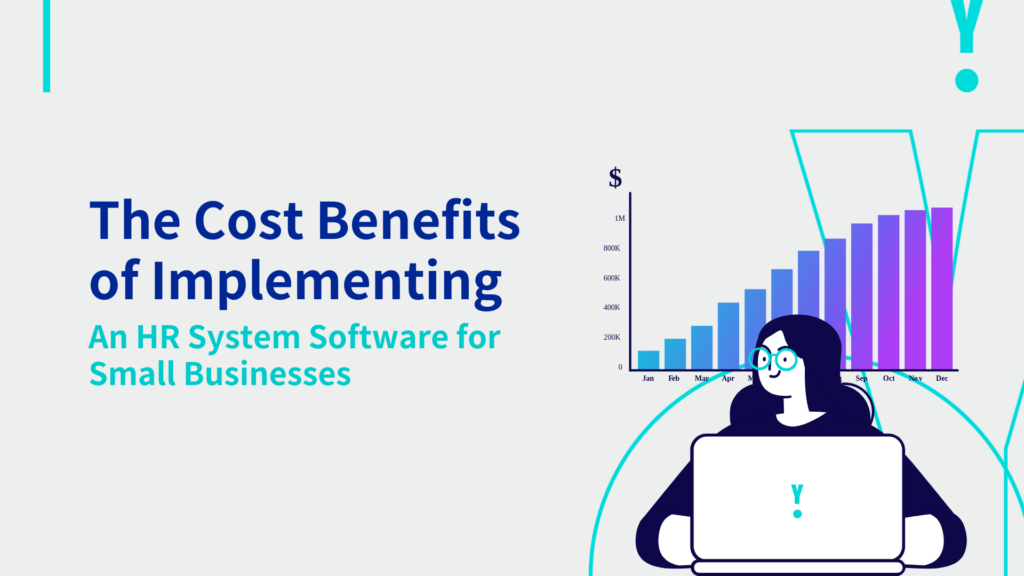
Managing HR tasks manually is time-consuming and costly for small businesses. Whether it’s payroll, employee records, or compliance, human errors and inefficiencies often translate into unnecessary expenses.
However, implementing an HR system software can dramatically change this.
For small businesses, an HR system streamlines HR functions, allowing teams to focus on business growth. The initial expenditure may be overwhelming, but the long-term benefits greatly surpass the costs. By automating tasks, improving accuracy, and ensuring compliance, these systems ultimately reduce operational costs.
In this blog, we will explore how investing in an HR system can provide cost benefits for small businesses. From reducing manual errors to improving employee management, these systems offer a lot of advantages.
Let’s dive into the detailed cost benefits small businesses can expect!
- Boosting Efficiency & Productivity
- Improving Compliance & Reducing Legal Costs
- Reducing Hiring Costs with Streamlined Recruitment
- Enhancing Employee Retention
- Reducing Operational Costs with Accurate Data Analytics
- Scalable Solutions for Growing Businesses
- Improved Employee Self-Service Features
- Final Thoughts
HR System Software That Streamlines Administrative Tasks
Time-consuming administrative tasks can drain resources in small businesses. Think about managing payroll, employee data, and benefits—doing this manually wastes valuable time that could be spent on growing the business. A well-implemented HR system automates these processes, reducing time spent on administrative tasks.
For example, an automated payroll system ensures timely and accurate salary disbursements. It eliminates the possibility of human error in calculating pay, which can lead to costly mistakes. An HR system also automates tasks like managing employee records, tracking attendance, and handling performance evaluations.
By automating these repetitive tasks, businesses save money on labor costs and minimize the risk of costly errors. These savings quickly add up, allowing businesses to reallocate resources toward other critical areas.
Boosting Efficiency & Productivity
Increased efficiency is one of the most immediate benefits small businesses notice after implementing a human resources information system. With tasks automated and streamlined, HR teams can focus on strategic initiatives, like talent development and company culture, rather than routine admin duties.
An HR system centralizes data, giving quick access to employee information, performance metrics, and compliance reports. It also improves decision-making speed and accuracy.
For example, having quick access to performance data allows managers to identify top performers and reward them appropriately.
When HR processes run smoothly, employees are more productive. They spend less time dealing with payroll issues or filling out forms and more time focusing on their roles. The increased efficiency contributes to a positive work environment, which can boost overall employee satisfaction and retention.
Improving Compliance & Reducing Legal Costs
Compliance with labor laws and regulations is a complex issue for small businesses. Without proper tools, the risk of violating regulations increases, which could lead to hefty fines or legal issues.
An HR system helps small businesses stay compliant with updated labor laws and tax regulations. It ensures that employee records, payroll, and benefits administration are properly handled. Additionally, these systems often come with automatic updates to reflect new legal requirements, removing the burden of constant manual updates.
For small businesses, avoiding legal issues can save thousands of dollars annually. With an HR system software, you can ensure timely tax filings, accurate wage payments, and adherence to overtime laws, which helps avoid costly penalties.
Hence, this level of accuracy gives peace of mind and protects your business from expensive legal battles.
Reducing Hiring Costs with Streamlined Recruitment
The hiring process can be costly and time-consuming. From advertising job postings to screening resumes and scheduling interviews, recruiting new employees often requires significant resources. However, an HR system streamlines recruitment, making it more cost-effective.
Many HR systems feature recruitment modules that automate job postings across multiple platforms, track applicants, and even manage interview schedules. This automation not only saves time but also reduces the costs associated with using external recruitment services.
Additionally, these systems often include features that allow for better talent pooling and tracking of candidates. Thus, it leads to more efficient hiring decisions.
By improving the recruitment process, small businesses can cut down on time-to-hire and reduce overall hiring costs. Therefore, the quicker you fill open positions with qualified candidates, the more money you save on prolonged vacancies and outsourcing.
Enhancing Employee Retention
Employee turnover is expensive, especially for small businesses with limited resources. Losing an employee not only affects morale but also brings direct costs like recruitment, onboarding, and training for new hires.
An HR system software enhances employee retention by improving engagement and development. With features like performance tracking, regular feedback, and professional development tools, an HR system helps create a transparent and supportive work environment.
Moreover, employees feel more valued when their progress is acknowledged, and their career paths are clearly defined.
Reducing Turnover Costs
Happy employees stay longer, reducing the need for constant rehiring. Lower turnover rates save businesses money by reducing recruitment costs and increasing productivity. Additionally, keeping experienced employees helps maintain consistency in your business operations, leading to better overall performance.
Reducing Operational Costs with Accurate Data Analytics
Data is a powerful asset for any business, and small businesses are no exception. An HR system provides detailed analytics on employee performance, compensation, and turnover, which helps in making data-driven decisions.
For example, analyzing workforce data can help identify trends, such as which departments have higher turnover rates or which employees are consistently underperforming. Hence, with this information, businesses can implement targeted improvements, such as additional training or adjusted compensation, before problems escalate.
So, small businesses can reduce operational inefficiencies and cut down costs related to high turnover or unproductive employees. Accurate data analytics also help small businesses create better financial projections and budgeting strategies.
Scalable Solutions for Growing Businesses
One of the biggest advantages of an HR management system is its scalability. Small businesses often worry that the systems they invest in today won’t be useful as they grow. However, most HR systems are designed to scale with your business, accommodating growth without the need for an overhaul.
As your company grows, your HR requirements will get increasingly complex. An HR system may accommodate this development by including new modules or functions, such as increased payroll, benefits management, and compliance monitoring. This scalability guarantees that your original investment continues to add value as your organization grows.
Instead of investing in new systems every time your company grows, scalable HR solutions save costs by adjusting to your changing needs without added expenses. So, to integrate an HR system to integrate into your business workflow, contact YOOV.
Improved Employee Self-Service Features
- Another cost-saving feature of HR systems is the employee self-service portal. These features allow employees to access their own payroll information, request time off, and update personal details without involving HR. This effectively reduces the administrative burden on HR teams and improves overall efficiency.
- Self-service portals empower employees to take control of their data, reducing the number of manual requests HR must handle.
Let’s take a small example. Instead of filling out paper forms for vacation requests or payroll queries, employees can easily manage these tasks online.
- With fewer interruptions from routine administrative requests, HR professionals can focus on strategic initiatives that drive business growth, reducing operational costs in the long term.
Final Thoughts
Investing in an HR system software might seem like a considerable expense at first glance, but the long-term cost benefits are undeniable. For small businesses, an HR system reduces administrative burdens, improves compliance, cuts hiring costs, and boosts employee retention—all of which lead to significant savings.
By automating time-consuming tasks, streamlining recruitment, and providing valuable analytics, an HR system ensures that your business runs efficiently. The initial investment pays off through increased productivity, reduced legal risks, and long-term scalability.
If your small business is looking to save costs while improving HR management, implementing an HR system is a smart, forward-thinking choice.
Connect with YOOV

Tel:+852 2988 8883
WhatsApp:Click Here
Email:cs@yoov.com
Website:https://www.yoov.com/